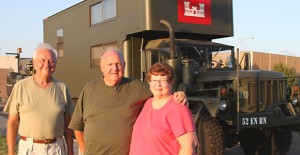By Roger Estlack, Clarendon Enterprise
A group of military vehicles that rolled into Clarendon last week wasn’t part of an invasion or troop movements but were instead part of a convoy on its way to Canada to commemorate the 70th anniversary of the Alaska Highway.

Dennis and Marilyn Boots of Denton and their friend Vern Hammett of Cornith stayed in their vehicles overnight on the Clarendon College campus while other members of their association stayed at the Best Western Red River Inn.
Mr. Boots, a Vietnam veteran and former member of the Army Corps of Engineers, joined the MVPA in 2009 when the association made a transcontinental convoy from Washington, DC, to San Francisco to commemorate the construction of the Lincoln Highway.
“It was 30 days at 30 miles per hour,” Boots said of the convoy that started with 40 vehicles and grew to as many as 150 vehicles along the way.
Their present journey is to head to Dawson Creek, British Columbia, where they will meet up with about 75 other antique military vehicles and travel along the Alaska Highway (or AlCan) to Delta Junction, Alaska, with one detour to drive up north to the Arctic Circle.
Boots and his wife travel in a 1960s cargo truck that originally was a portable laundry unit for the Army. Boots, however, has transformed the cargo hold of the truck into a luxurious command post with handcrafted wooden cabinets, a shower, a toilet, and bunk beds. The air-conditioned quarters also sports the trucks original mahogany floor planks that have been polished to a beautiful shine.
Towed behind the Boots’ command truck is a Vietnam-era Jeep, named Jezebel, that will serve as the last car in the AlCan convoy, the same as it did for the Lincoln Highway trip three years ago.
Hammett met Boots and his wife when he joined the Lincoln convoy after it had started, and they became fast friends after learning that they lived very near each other.
“We traveled 800 miles to meet each other,” Hammett said.
Hammett drives a retired Air Force truck that has been outfitted with a camper.
Boots said the convoy is entirely self-sufficient when it is underway, and the breadth and depth of experienced military veterans and engineers that travel with the MVPA mean that all equipment can be repaired on the road if any of it breaks down. But just because these trucks are old doesn’t mean they are decrepit.
“Most of these vehicles are in as good or better shape than when they were in the service,” Boots said. “We’re serious about this.”
Established in 1976, the non-profit MVPA is dedicated to providing an international organization for military vehicle enthusiasts, historians, preservationists and collectors interested in the acquisition, restoration, preservation, safe operation and public education of historic military transport.


Leave a Reply
You must be logged in to post a comment.